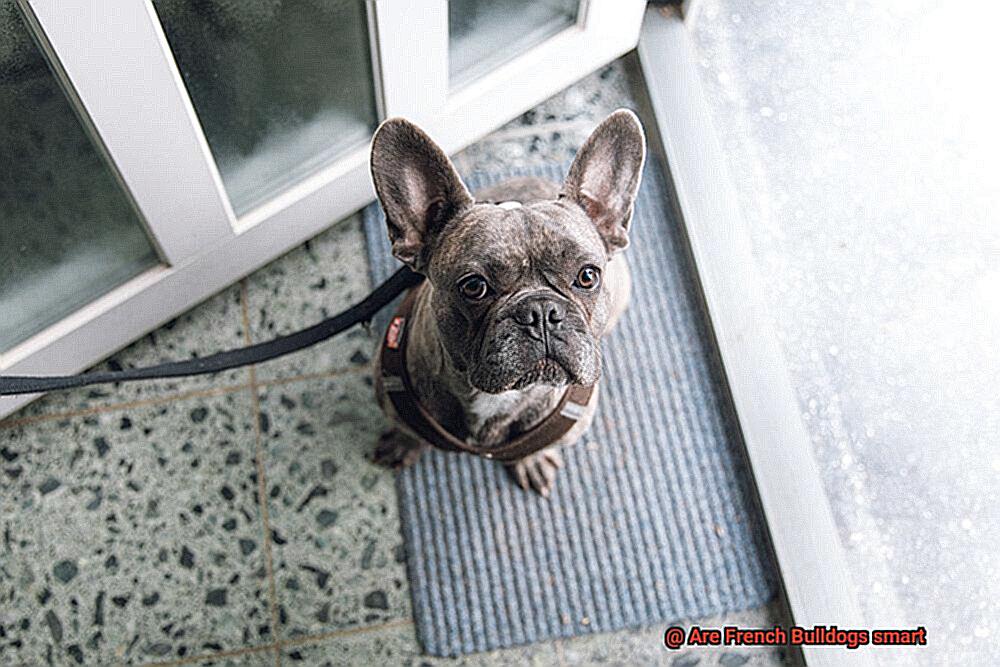Are French Bulldogs smart?
These little guys are famous for their cute ears and wrinkly faces that make them irresistible to dog lovers everywhere. But what about their brains?
Are French Bulldogs actually smart, or are they just cute? In this post, we’re going to dive into the world of French Bulldog intelligence.
So, let’s get started and discover just how smart French Bulldogs really are.
What Factors Contribute to French Bulldog Intelligence?
Contents
- 1 What Factors Contribute to French Bulldog Intelligence?
- 2 How Trainable are French Bulldogs?
- 3 Assessing Problem-Solving Skills of French Bulldogs
- 4 Evaluating the Adaptability of French Bulldogs
- 5 Can We Measure Intelligence in Dogs?
- 6 Do French Bulldogs Have Unique Qualities that Make Them Intelligent?
- 7 Are All Breeds of Dogs Smart in Their Own Ways?
- 8 Conclusion

While opinions may vary, understanding the factors that contribute to French Bulldog intelligence can help you unlock their full potential. In this comprehensive guide, we will explore the genetic, environmental, and training factors that shape their intelligence. So, let’s dive in and discover what makes French Bulldogs smart.
Genetic Factors:
Just like humans, French Bulldogs inherit certain traits from their parents. Selective breeding practices that prioritize intelligence can increase the chances of producing intelligent offspring. When choosing a puppy, consider reputable breeders who value intelligence in their breeding program.
Environmental Factors:
The environment in which a French Bulldog grows up plays a crucial role in shaping their intelligence. Providing a stimulating and enriching environment from an early age can boost cognitive abilities. Toys, puzzles, and interactive games can keep their minds active and engaged.
Training and Socialization:
Consistent training and positive reinforcement methods are essential for developing your French Bulldog’s intelligence. Start with basic obedience commands and gradually introduce more advanced tasks. Socializing them with different people, animals, and environments will enhance problem-solving skills and adaptability.
Health and Nutrition:
Maintaining good overall health is vital for cognitive function. Ensure your French Bulldog receives proper nutrition, regular exercise, and routine veterinary care. Health issues such as allergies or respiratory problems can affect mental alertness and learning ability.
Owner’s Interaction:
Spending quality time with your French Bulldog is key to fostering their intelligence. Regular playtime, mental stimulation activities, and bonding experiences strengthen the owner-dog relationship. Positive interactions build trust and improve communication.
Breed-Specific Characteristics:
French Bulldogs possess unique characteristics that contribute to their intelligence. They are alert, curious, and adaptable. Their willingness to please and eagerness to learn make training easier and enhance problem-solving abilities.
How Trainable are French Bulldogs?
French Bulldogs, also known as “Frenchie” by their adoring fans, are undeniably one of the most popular dog breeds around. But how trainable are they? Can you teach them to sit, stay, and roll over? Well, the answer is a resounding yes, but with a few caveats. Let’s dive into the world of Frenchie training and discover the best methods for unlocking their full potential.
The Intelligence Factor
French Bulldogs are generally considered intelligent dogs. They have the capacity to learn and understand commands, but it’s important to note that their trainability can vary from individual to individual. Some Frenchies may be quick learners, while others may require more time and patience.
The Stubborn Streak
One thing that sets French Bulldogs apart is their stubbornness. They have an independent nature that can make training a bit challenging at times. However, don’t let this discourage you. With the right approach and consistent training techniques, you can conquer their stubborn streak and achieve great results.
Start Early
The key to successful training with French Bulldogs is starting early. Begin training them as soon as you bring them home, ideally when they are still puppies. This will help establish good behavior and obedience habits from an early age.
Positive Reinforcement is Key
French Bulldogs respond well to positive reinforcement training methods. They are highly motivated by food, so using treats as rewards can be highly effective. Praise and affection are also important tools in the training process. Make sure to shower them with love whenever they exhibit the desired behavior.
Short and Engaging Sessions
French Bulldogs have a relatively short attention span, so it’s best to keep training sessions short and engaging. Aim for 10-15 minute sessions a few times a day rather than long, drawn-out sessions. This will help keep them focused and motivated.
Consistency is Crucial
Consistency is key when training French Bulldogs. They thrive in a structured environment, so make sure to enforce the rules consistently. If you let them get away with certain behaviors sometimes and correct them other times, they may become confused or lose interest.
Gentle Corrections
French Bulldogs are sensitive souls, so it’s important to use gentle corrections during training. Avoid harsh methods or punishment, as this can damage the trust between you and your furry friend. Instead, focus on positive reinforcement and redirecting their attention towards the desired behavior.
Patience and Persistence
French Bulldogs have a tendency to assert their own will and can be stubborn at times. Patience and persistence are crucial when training them. Don’t give up if they don’t grasp a command right away. Keep practicing, be patient, and celebrate even the smallest victories.
Assessing Problem-Solving Skills of French Bulldogs
French Bulldogs are known for their intelligence and problem-solving abilities. As a proud owner of this delightful breed, you may be wondering how to assess and nurture their problem-solving skills. In this article, we will explore different methods to evaluate your French Bulldog’s mental capabilities and provide appropriate mental stimulation.
Interactive Toys and Puzzles:
Interactive toys and puzzles are a great way to assess problem-solving skills in French Bulldogs. These toys require the dog to solve a problem, such as figuring out how to retrieve a treat from a hidden compartment.
By observing their behavior and techniques, you can gain insights into their problem-solving abilities. Some popular interactive toys for French Bulldogs include the Kong Classic and the Nina Ottosson puzzle toys.
Training Exercises:
Training exercises that involve problem-solving tasks can also be beneficial. For example, teaching your French Bulldog to find a hidden object or navigate an obstacle course can test their ability to think critically and find solutions.
Start with simple tasks and gradually increase the difficulty level as your dog becomes more adept at problem-solving.
Everyday Situations:
Observing your French Bulldog’s behavior in everyday situations can provide valuable insights into their problem-solving skills.
Pay attention to how they approach challenges, whether they try different strategies, and how quickly they adapt to new situations. This will help you understand their individual problem-solving style.
Individual Differences:
It is important to remember that each French Bulldog may have different problem-solving abilities. Some may be quick learners while others may require more time and patience. Be patient with your furry friend and tailor your training methods to suit their unique abilities.
Regular Mental Stimulation:
Regular mental stimulation is key to enhancing problem-solving skills in French Bulldogs. Engaging them in activities that require problem-solving, such as hide-and-seek games or treat-dispensing toys, can keep their minds sharp and prevent boredom. Mental stimulation not only exercises their problem-solving abilities but also contributes to their overall well-being and happiness.
Evaluating the Adaptability of French Bulldogs
French Bulldogs have gained immense popularity over the years for their charming personalities and unique appearance. One of their standout qualities is their adaptability, making them suitable for a wide range of living situations. In this blog post, we will explore the factors that contribute to their adaptability and why they make a perfect fit for any lifestyle.
Size Doesn’t Matter:
French Bulldogs may be small in size, but they have big hearts and an even bigger capacity to adapt. Their compact physique allows them to thrive in apartments or houses with limited space. Unlike larger breeds, they don’t require extensive exercise or vast outdoor areas to roam around. As long as they receive regular exercise and mental stimulation, French Bulldogs can be content and comfortable in smaller living spaces.
Laid-back Temptations:
The laid-back and easygoing temperament of French Bulldogs is another key factor in their adaptability. They are not high-energy dogs and are content with moderate exercise, making them a great choice for individuals or families with busy lifestyles.
They are equally happy snuggling on the couch or going for a leisurely stroll in the park. Their adaptable nature allows them to adjust their energy levels based on their owners’ lifestyle.
Social Butterflies:
French Bulldogs are known for their sociability and friendly nature. They easily form strong bonds with their human companions and get along well with other animals.
This sociability enables them to adapt effortlessly to new environments and people, making them ideal travel companions or additions to households with multiple pets. Their adaptability shines through in their ability to seamlessly integrate into new social settings.
Individual Variations:
While French Bulldogs are generally considered adaptable, it’s important to recognize that each dog is an individual. Some may be more adaptable than others based on genetic predispositions and early socialization experiences. It’s essential to consider these factors when bringing a French Bulldog into your home and provide them with the necessary care and attention they need to thrive in their new environment.
Can We Measure Intelligence in Dogs?
If you’ve ever wondered whether your furry friend is a smarty-pants or just a lovable goofball, you’re not alone. The topic of measuring intelligence in dogs has been a hot topic among researchers for years. So, let’s dive into this fascinating subject and see what we can uncover.
Traditional Methods: Obedience Training and Problem-Solving
In the past, researchers have relied on obedience training and problem-solving tasks to measure a dog’s intelligence. While these methods can give us some insights into a dog’s cognitive abilities, they might not paint the full picture. After all, not every dog is a master problem-solver or an obedience champion.
The IQ Test: A Dog’s Brainpower
One popular method used to gauge dog intelligence is the “intelligence quotient” or IQ test. This test evaluates a dog’s ability to learn new commands and solve problems. Some breeds, like Border Collies and Poodles, tend to ace these tests more often than others.
IQ tests might not capture all aspects of a dog’s intelligence, as they primarily focus on obedience and problem-solving skills.
Beyond Obedience: Social Intelligence and Emotional Quotient
Intelligence in dogs goes beyond just following commands or solving puzzles. Dogs also have social intelligence and emotional abilities. Some breeds excel in tasks related to social cognition, like reading human facial expressions or understanding gestures. So, don’t underestimate your French Bulldog’s knack for understanding your emotions with those adorable eyes.
Brain Imaging: A Peek into Canine Brains
Advances in technology have allowed researchers to study the brains of our canine companions using brain imaging techniques. These studies have revealed fascinating insights into the similarities and differences between human and dog brains. By studying the neural mechanisms underlying cognitive processes, scientists are gaining a deeper understanding of how to measure intelligence in dogs more objectively.
But Remember, It’s Not Just About Breed or Test Scores
Intelligence in dogs is a complex puzzle influenced by genetics, environment, and training. Each individual pup has their own unique set of strengths and weaknesses, just like us humans. So, measuring intelligence in dogs remains an ongoing area of research without a definitive answer.
Do French Bulldogs Have Unique Qualities that Make Them Intelligent?
French Bulldogs are more than just adorable and affectionate pets. They possess a unique set of qualities that make them intelligent and highly adaptable. As an expert in this field, I’ll delve into the distinctive attributes that contribute to their intelligence and demonstrate why French Bulldogs make exceptional companions for those seeking an intelligent and loyal furry friend.
- Problem-Solving Skills: French Bulldogs have an innate ability to overcome obstacles and find solutions. Whether it’s figuring out how to open a door or retrieve a hidden toy, their problem-solving skills are truly impressive.
- Exceptional Memory: Once a French Bulldog learns something, they remember it for a long time. This exceptional memory greatly facilitates their training, as they quickly grasp commands and recall them accurately.
- Emotional Intelligence: French Bulldogs possess a remarkable understanding of human emotions. They are highly perceptive, picking up on subtle cues, and responding appropriately. This emotional intelligence makes them ideal companions and even excellent therapy dogs.
- Effective Communication: Communication is key in any relationship, and French Bulldogs excel in this aspect. With a wide range of vocalizations and adept use of body language, they effectively express their needs, desires, and even their moods.
- Playful Nature: Despite their small size, French Bulldogs have big personalities. Their playful nature contributes to their intelligence as they constantly explore and engage with their surroundings. This curiosity drives them to learn new things and keeps their minds sharp.
- Loyalty and Eagerness to Please: French Bulldogs are devoted and loyal to their owners, making them eager to please. Combined with their intelligence, this eagerness enables them to excel in training exercises and tasks that require mental stimulation.
- Mental Stimulation: While French Bulldogs may not be the most physically agile breed, they excel in activities that challenge their minds. Puzzles, interactive toys, and games that require problem-solving keep their brains active and engaged.
It’s important to note that while French Bulldogs possess these unique qualities, individual differences exist within the breed. Some may exhibit higher levels of intelligence than others, but overall, French Bulldogs are known for their intelligence.
Are All Breeds of Dogs Smart in Their Own Ways?
When discussing their intelligence, opinions may vary. However, it is important to consider the unique forms of intelligence that French Bulldogs possess. In this blog post, we will explore the distinct qualities that make Frenchies smart in their own ways.
Social Intelligence:
French Bulldogs are known for their exceptional social intelligence. They have an innate ability to understand human emotions and form deep connections with their owners. Their empathetic nature allows them to provide comfort and support in times of need, making them excellent therapy dogs.
Trainability:
While they may not be the most trainable breed, French Bulldogs are quick learners when it comes to basic obedience commands. Their desire to please their owners and their motivation for food rewards make training sessions relatively easy. With patience and consistency, they can become well-behaved companions.
Problem-Solving Skills:
French Bulldogs may not be natural problem solvers like some other breeds, but they do possess a certain level of ingenuity. They can find clever ways to get what they want, such as opening doors or navigating obstacles. Their ability to adapt and think on their feet showcases their intelligence in a different way.
Adaptability:
Intelligence is not solely measured by trainability or problem-solving skills; adaptability plays a significant role as well. French Bulldogs excel in this aspect, as they can adapt well to different living situations. Whether in an apartment or a busy household, Frenchies adjust quickly and effortlessly.
Communication Skills:
French Bulldogs have excellent communication skills, both with humans and other dogs. They are adept at picking up on subtle cues and body language, allowing them to understand and respond appropriately. This skill contributes to their ability to form strong bonds with their owners and interact harmoniously with others.
Adv5fsQiKd8″ >
Conclusion
To sum up, French Bulldogs are undeniably intelligent canines. While they may demonstrate their smarts in distinct ways compared to other breeds, they possess remarkable qualities that showcase their intelligence.
Their social intelligence is exceptional, enabling them to comprehend and empathize with human emotions. This makes them outstanding companions and adept therapy dogs. Although not topping the charts in trainability, they still impress with their ability to quickly grasp basic obedience commands and become well-mannered pets when trained patiently and consistently.
French Bulldogs also possess problem-solving skills, albeit in a unique manner. While they may not excel at intricate puzzles, they have a knack for finding ingenious solutions to everyday challenges.
Moreover, their adaptability sets them apart from many other breeds. Whether it’s a snug apartment or a bustling household, French Bulldogs thrive in various living situations.
Lastly, their communication skills contribute significantly to their overall intelligence. They possess an innate understanding of both human and canine body language and cues, fostering strong bonds with their owners and facilitating harmonious interactions with others.
In conclusion, French Bulldogs are highly intelligent dogs that bring boundless joy and companionship to their owners. Their distinctive qualities make them incredibly adaptable and capable of forging deep connections with humans.




